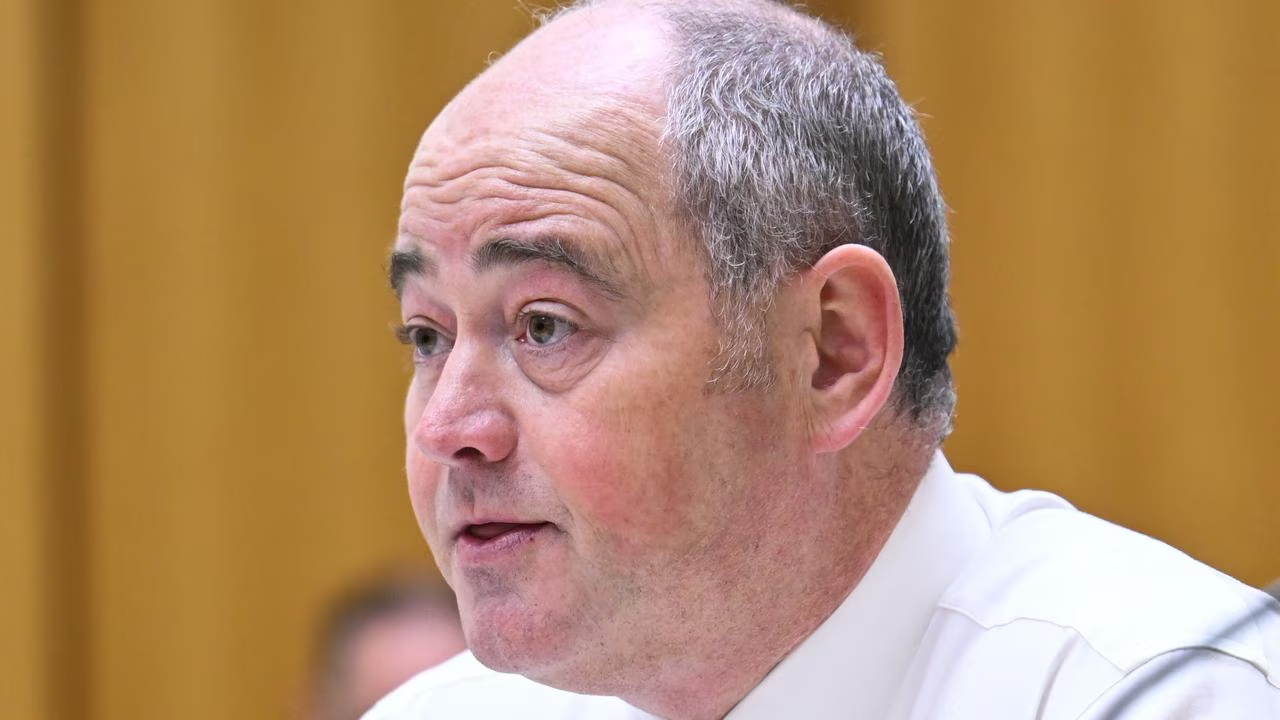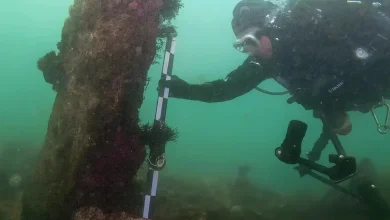‘Impunity’: Bank slams social media giants

One of Australia’s big four banks has taken aim at a lack of regulation for global giants, such as Meta, saying it is in their interest to allow fraudulent advertising.
National Australia Bank chief executive Andrew Irvine called out Meta, saying the business should operate under similar “know your customer” KYC laws that banks use.
Under KYC rules, Australian banks need to verify customers’ identities to prevent money laundering and terrorism financing.
“In Australia, as a bank, if you want to open a bank account, the bank needs to verify your identity and needs to know you are you,” Mr Irvine said.
He noted the Australian banks do a “good job of it”, including making customers take “live selfies” to ensure they can identify who is using the financial product.
“I contrast that with digital platforms,” he said.
“I can open up a digital account with username and password with impunity. I can open thousands, nay, tens of thousands without verifying my identity,” he said.
Using the example of a fake credit card rewards ad, Mr Irvine said “it was offering a $200 fee for an annual card that was giving an enormous amount of loyalty points that were pretty unbelievable … around $1500 worth of value”, he told the House of Representatives economic committee.
“We asked Meta to shut that down, they did, but it was popping up like weeds all over the place,” he said.
“This is the root of the problem we need to get digital platforms to solve.”
Mr Irvine labelled the lack of KYC laws as “economically problematic” as the platforms themselves are profiting from the criminal activity.
He said Australia introduced world-leading laws by banning teenagers from accessing the platforms and encouraged the government to also look into the fraudulent payment sector.
NAB’s call follows similar claims from CBA chief executive Matt Comyn, who said laws were not keeping pace with technological advancements giving giant US companies an advantage over local Aussie businesses.
“There is no moat, no ocean that’s large enough that’s going to protect Australian industries from the technology shifts and the technology players,” he told MPs on Tuesday.
Describing payments as a “sovereign capability”, Mr Comyn broadly supported the government’s call to ditch debit and credit card surcharging estimated to save consumers $1.2bn annually.
Bank calls for overhaul
Australia needs to overhaul its migration system and adopt a point systems to ensure the country gets the skills required.
NAB chief executive Andrew Irvine says Australia should follow Canada’s example by conducting annual reviews of the economy to identify critical skill shortages, then adjusting migration settings accordingly.
The bank boss says currently Australia needs to attract workers in sectors such as construction, STEM and hospitality where the country is currently falling behind.
“As a country we should have a very dynamic immigration setting,” he said.
“Canada is a good example of a country who has done this quite well, where every year you look at your economy and the skills that your economy needs to grow and prosper and you adjust on some sort of points system for the migrants that you want to be taking in.”
Using the example of construction, Mr Irvine said Australia could use the point system to lower the bar for these types of workers until the nation had enough employees in the sector before raising it again.
Bank boss’s grim call on Aussie kids
Australia’s reputation as “the lucky country” may be over, as economic experts warn of unprecedented challenges ahead for future generations.
In an ominous warning, NAB chief executive Andrew Irvine has raised concerns about the economic legacy being left for tomorrow’s Australians.
”Generation after generation of Australians, people came to our shores and they would have absolute certainty that their children would have a better life than they did,” he told the House of Representatives Standing Committee on Economics.
When pressed further, Mr Irvine said Australia was no longer the place where this was guaranteed.
“For the first time in our history, parents can’t look at each other and with conviction say their children will have a better life than they did,” he said.
“That is what every parent wants to say.”
Mr Irvine said Australia needed to focus on three things if they wanted their kids to have a better future.
”It’s housing, energy and regulation. They are the three things we need to push into as a country,” he said.
‘Sad’: Energy transition slammed
Bank chiefs have slammed Australia’s energy mix, labelling it as “sad” given the nation has the potential to be an “energy superpower”.
Deputy chair Simon Kennedy asked Mr Irvine why Australian energy bills were rising.
Mr Irvine said the price of energy should be lower in Australia.
“Australia could have the lowest energy costs in the world and deliver on net-zero emissions with the narrative being completely wrong,” Mr Irvine said.
He said the debate around net zero was wrong and Australia could lower its power bills through increasing energy production.
“As a country, we need to be doing a much better job of getting energy to market, both renewable and natural gas, to decarbonise the grid, get rid of the coal and become an energy superpower,” he said.
“We could have one of the world’s lowest energy costs, deliver net-zero energy and be a wonderful exhibit to the world.”
Mr Irvine said Australia should be an energy superpower.
“We are blessed with incredible amounts of sunshine, wind resources, some hydro capacity and one of the world’s largest reservoirs of natural gas.
“The fact that we are in a situation where we have a supply and demand imbalance on energy is sad and shouldn’t have happened.”
Mr Irvine said the country had not focused enough on approving new supply, and that was ultimately costing every household.
“We are not getting enough renewable projects, we are not getting enough gas projects approved and the AEMO is forecasting a shortage of gas on the eastern seaboard by 2028-2029,” he continued.
Mr Irvine said this should have been avoided.
When asked earlier in the day, ANZ chief executive Nuno Matos said the “medicine could kill the patient” in reference to the drive to decarbonisation.
Mr Kennedy asked Mr Matos whether he thought the world would achieve net zero by 2050.
“Some still believe it’s possible, but I would say at this point in time, it seems to be difficult to reach with the current dynamics, with the current technology, with the current public stance in many parts of the world,” Mr Matos said.
Rate cuts over
In a warning sign to every homeowner, Mr Irvine says it’s unlikely there will be any further interest rate cuts.
“Our prediction is we will not see further interest rates over the next year,” he said.
Mr Irvine said inflation would remain stubborn, while the economy would grow between 2.3 and 2.5 per cent.
The bank forecasts the economy can only grow at 2.5 per cent without stoking higher inflation, unless there’s a productivity boost.
Biggest change in our lifetime
The NAB boss was also bullish on artificial intelligence, comparing it to some of the major productivity changes in our lifetime.
When asked about AI taking workers’ jobs, Mr Irvine said AI would be as big as the internet and electrification but cautioned it would have mixed outcomes for workers.
“AI isn’t going to take your job but workers who know how to use AI well will take the jobs of workers who are afraid of AI,” Mr Irvine said.
Mr Irvine said Australia needed to upskill the labour force to better work with AI.
When pressed further, he said AI could cost some jobs, but the country should not shy away from it.
“We have an economy that is short of labour today. We are the country’s biggest business bank and when I talk to them up and down the country, access to labour remains one of the biggest challenges for them,” he said.
“Unemployment is at incredibly low levels.”
ANZ defends super profits
ANZ has sounded the alarm on Australian banking profitability, saying it is ultimately a good thing for everyone if the financial sector has money to “lend to the economy.”
ANZ chief executive Nuno Matos said banking profitability wasn’t what it used to be.
“The Australian banking sector has been reducing its profitability for more than a decade,” Mr Matos said.
“On average the industry is about 60 per cent less profitable than it was 10 years ago for many reasons, including more compliance costs, capital and competition is much more fierce today, which is great for customers.”
Mr Matos said it was in everyone’s best interests for the banks to be profitable.
“It is in the best interest of the nation to have a solid profitable financial system that has capital to lend to the economy,” he said.
“I don’t want to take the accountability (away) from me and my team as we need to improve the profitability so we can lend more to the economy.”
KPMG’s Australian major bank full-year 2025 results analysis shows the big four combined reported $29.8bn in profits, which remained broadly flat with a marginal reduction of 0.5 per cent compared with FY24.
Mr Matos’ comments were similar to Commonwealth Bank chief executive Matt Comyn, who on Tuesday told the standing committee comments the bank makes “super profits” are “untrue.”
“This view that banking is very concentrated, has very high barriers to entry and therefore super profits are being earned is a narrative we have done a poor job of countering and has been left unchallenged,” he said.
Mr Comyn said the banks needed to generate a level of profitability in order to be viable.
“One of the reasons profitability is so important versus profits is that banking is different in that we don’t just take deposits and make loans,” he said.
“Every time we make a loan we have capital set aside for expected and unexpected losses.
“There’s only two sources for that, either you have to generate profits as an institution or ask the shareholders or investors for the money.”
Mr Comyn said for every $500,000 loan, the bank would set aside $15,000, but if the person repaying the loan fell behind, the bank had to up that buffer rate to more than $100,000.
“Why this matters is we have seen some significant competitive shifts and of course that increasing competition and pressure is by and large good for consumers,” he said.
Be a better bank
Australia’s fourth largest bank has vowed to become a “better organisation” after facing intense parliamentary scrutiny over a record-breaking fine and a sharp decline in profits.
Labor member for Moreton Julie-Ann Campbell grilled Mr Matos about whether the bank will improve its culture in light of profits falling by 10 per cent.
“I believe all the stakeholders around us want us to change,” Mr Matos responded.
“The regulators want us to change, our customers, especially those impacted by the issues, want us to be a better bank.
“And we are very eager to be a better organisation.”
Mr Matos said overall the bank had tremendous positive elements, but negative things “have happened.”
In early November, ANZ’s full-year statutory profit had fallen by 10 per cent after a $240m fine from the corporate watchdog – the largest in corporate regulatory history – for widespread misconduct.
The major bank said statutory profit as of September 30 had fallen from the previous year to $5.9bn, according to full-year results released on Monday.
Cash profit also fell by 14 per cent following settlement with ASIC as well as restructuring costs.
The big four bank admitted to incorrectly reporting its bond trading data to the Australian government by tens of billions of dollars as well as widespread misconduct across products and services provided to almost 65,000 customers.
ANZ’s dire warning to manufacturing industry
Australian manufacturing could be under threat as the banking sector could struggle to finance it due to the high cost of energy.
The warning emerged during parliamentary questioning where an ANZ executive confirmed that energy costs were a key consideration when the bank assesses lending to manufacturing businesses, adding further pressures to the sector.
During a House of Representatives Standing Committee on Economics hearing, Liberal Party member for Casey, Aaron Violi, asked ANZ if they could still lend money to Australian manufacturing businesses, despite the high cost of energy.
In response, ANZ chief executive Nuno Matos said the bank looks at many factors when it comes to financing any business.
“It is expected for a bank of our size and our complexity to take into account all the factors when considering where we apply the money we receive from our depositors,” Mr Matos said.
“By definition, we take into account the sustainability of a manufacturing company, including how dependent they are from energy and sources that are expensive which could make them unprofitable.”
However, he stopped short of saying ANZ had stopped funding manufacturing businesses.
“If you are asking us if we are restricting credit because of that factor, I don’t have data to give you today”
Mr Violi’s comments follow the country’s largest steelmaker, BlueScope, saying high energy prices including on gas could force local manufacturers to leave Australia.
BlueScope Steel urged the federal government to take action on installing a reservation scheme to ensure supplies for local industry.
Deputy chair Simon Kennedy further quizzed Mr Matos about what was driving up the costs of energy, specifically if it was a lack of investment in gas.
In response, Mr Matos said any restrictions on the supply of energy, including from gas, would by definition “increase the cost of capital” and lead to “higher costs of the end product” for users.
Multi-bank hubs the way to save regional banking
Mr Matos said Australia needed to establish “multi-bank hubs” to stop the collapse of rural bank branches across the country.
During the standing committee the ANZ boss said “access to basic banking services in all Australia is crucial”.
He called a multi-bank hub a sustainable solution to the problem.
“We acknowledge how important it is to deliver basic service to Australians in remote areas, and will continue to comply with all our obligations,” he says.
“Solutions like remote ATMs should be further explored. Solutions like banking hubs, which basically are multi bank branches, should be explored.”
The big-four banks have agreed on a moratorium on bank closures until mid-2027, while Westpac committed to extending this through until 2030.
No bonus as staff get fired
Mr Matos has apologised to staff who have lost their jobs, saying it is not “something he is proud of doing”.
Committee chair Ed Husic suggested the cutting of 3500 staff members was a result of the bank’s government bonds scandal and mishandling of retail customers.
In September, ANZ announced plans to cut 3500 staff and 1000 contractors – or almost 10 per cent of jobs – over the next 12 months in an effort to “simplify the bank”.
Staff will depart the business by September 2026.
Mr Husic said there was an uncomfortable perception that while 3500 staff members would lose their jobs, the executive team simply “didn’t get a bonus”.
Mr Matos said most of the staff who were responsible for ANZ’s previous issues had left the bank.
“Many of the executives are not in the company anymore …. Roughly half of our senior team is not with us anymore,” he replied.
“That is one of the most severe demonstrations of accountability, but I see your point. “Letting go 3500 people is not something I am proud of or would like to do, it is not something a human being likes to do.”
Mortgage business not what it used to be
Mr Matos said mortgages were one of the least profitable parts of the bank’s business, saying the money made on home loans is not what it was 15 years ago.
He said the bank today made about three times less than it did in previous decades.
He was pressed further by deputy chair Simon Kennedy, who claimed the average Aussie paid back $200,000 across their lifetime in “profits to the bank”.
Mr Matos, like Commonwealth Bank boss Matt Comyn and Westpac chief executive Anthony Miller, who faced the music on Tuesday, said there was a difference between profits and profitability.
Instead, Mr Matos said small businesses were the “hottest part of the market”.
ANZ apologises for misconduct
Mr Matos apologised for the bank’s previous failures that led to a record $240m fine.
The bank was ordered to pay up for widespread misconduct after ASIC found it mishandled a bond sale, potentially costing the federal government millions, as well as misconduct that impacted 65,000 retail customers.
The bank agreed to the penalty – the largest in regulatory history – although the Federal Court still needs to approve it.
In his opening remarks, Mr Matos made an unreserved apology as he talked about his role in reshaping the bank.
“The bank fell short of what is expected of us and for that I offer an apology,” Mr Matos said.
“We have appointed the right leadership to reshape the base and I personally oversee our actions on non-financial risks to ensure progress drives accountability and removes roadblocks.”
In his opening question, Mr Husic asked if ANZ was able to “take advantage of a national government”, what assurances should ordinary customers have they won’t do the same thing to them.
“Our shortcomings are unacceptable,” Mr Matos replied.
“It was very important to me and to us to understand why this happened and there has been a lot of work done on it by us.”
Mr Matos said it would take years, but the bank was committed to improving its culture and governance.
Major bank chiefs grilled
The bosses of Australia’s biggest banks are facing a parliamentary grilling as the government takes aim at interest rates, fees and scam protections.
Following Tuesday’s appearance from Commonwealth Bank and Westpac, Mr Matos and Mr Irvine are facing the music today.





